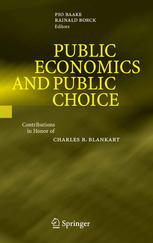

Most ebook files are in PDF format, so you can easily read them using various software such as Foxit Reader or directly on the Google Chrome browser.
Some ebook files are released by publishers in other formats such as .awz, .mobi, .epub, .fb2, etc. You may need to install specific software to read these formats on mobile/PC, such as Calibre.
Please read the tutorial at this link: https://ebookbell.com/faq
We offer FREE conversion to the popular formats you request; however, this may take some time. Therefore, right after payment, please email us, and we will try to provide the service as quickly as possible.
For some exceptional file formats or broken links (if any), please refrain from opening any disputes. Instead, email us first, and we will try to assist within a maximum of 6 hours.
EbookBell Team

0.0
0 reviewsThis volume collects essays in honor of Charles Beat Blankart on the oc- th sion of his 65 birthday. Blankart's research is mainly in the area of public finance and public choice. He is also known for his interest in real world problems and intellectual curiosity. These features seem to be well c- veyed by the contributions. Born in Switzerland, Blankart completed his Ph. D. in Basel before moving to Germany. The typically Swiss perspective on individual freedom, h- ever, has remained with him. Blankart has taught at the Free University of Berlin, the University of the Federal Armed Forces in Munich, Technical University and Humboldt University in Berlin. Throughout his prof- sional positions, Blankart has contributed to various fields, including p- lic finance, public choice, federalism and industrial organization and re- lation. He has left significant marks in these fields, emphasizing throughout how incentives shape the behaviour of individuals, be it in markets or in government. For example, his best selling textbook - fentliche Finanzen in der Demokratie, is unique in bringing a unified p- spective to the study of public finance, treating politicians as ordinary self interested individuals and doing largely away with the benevolent welfare maximizing social planner.